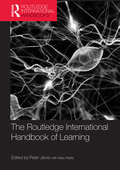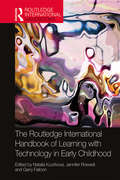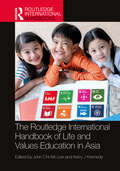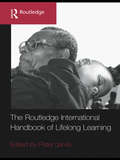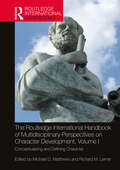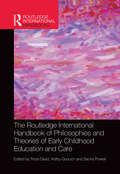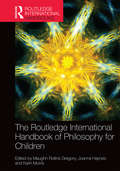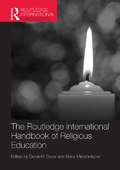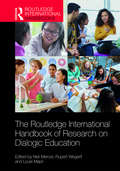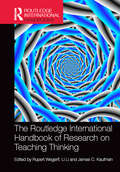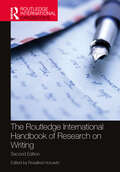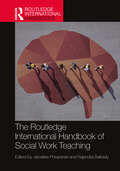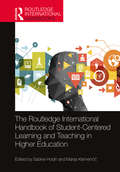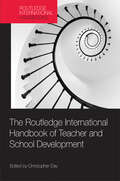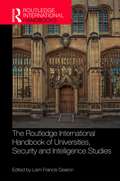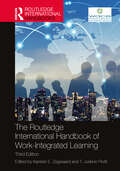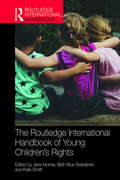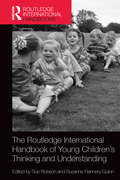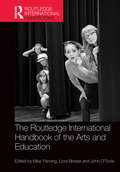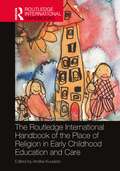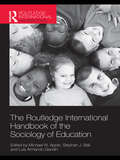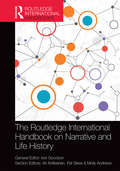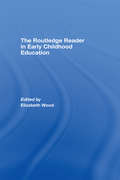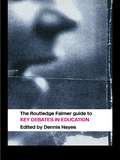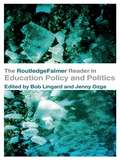- Table View
- List View
The Routledge International Handbook of Learning (Routledge International Handbooks Of Education Ser.)
by Mary Watts Peter JarvisAs our understanding of learning focuses on the whole person rather than individual aspects of learning, so the process of learning is beginning to be studied from a wide variety of perspectives and disciplines. This handbook presents a comprehensive overview of the contemporary research into learning: it brings together a diverse range of speciali
The Routledge International Handbook of Learning with Technology in Early Childhood (Routledge International Handbooks of Education)
by Jennifer Rowsell Natalia Kucirkova Garry FalloonThe Routledge International Handbook of Learning with Technology in Early Childhood focuses specifically on the most cutting-edge, innovative and international approaches in the study of children’s use of and learning with digital technologies. This edited volume is a comprehensive survey of methods in children’s technologies and contains a rich repertoire of studies from diverse fields and research, including both educational and developmental psychology, post-humanist literacy, applied linguistics, language and phenomenology and narrative approaches. For ease of reference, the Handbook's 28 chapters are divided into four thematic sections: introduction and opening reflections; studies answering ontological questions, which theorize how children take on original identities in becoming literate with technologies; studies answering epistemological questions, which focus on how children’s knowledge and learning are (co)constructed with a diverse range of technologies; studies answering practice-related questions, which explore the resources and conditions that create the most powerful learning opportunities for children. Expertly edited, this interdisciplinary and international compendium is an ideal introduction to such a diverse, multi-faceted field.
The Routledge International Handbook of Life and Values Education in Asia (Routledge International Handbooks of Education)
by John Chi-Kin Lee Kerry J KennedyThis Handbook provides a comprehensive look at the educational scope of life and values that characterize 21st-century Asia, as well as those values shared across cultures.Some values are deeply resonant with the region’s past while others reflect modernity and the new contexts in which Asian societies find themselves. Exploring these values of different types and the way they are constructed in Eastern and Western contexts, the contributors delve into the diversity of religious, moral and social education to promote greater understanding across cultures. While a range of values is identified here, there is no single set of values that can be applied to all people in all contexts. The time has long gone, even for single societies, when values can be imposed. Yet this Handbook emphasizes both the extent and importance of values to individuals and their societies—how they respond to these values may provide the key to better and more caring societies and to better lives for all.Academics and teachers will find this Handbook resourceful because it raises important theoretical issues related to social values and their formation in distinctive contexts and provides novel insights into the diverse educational landscape in Asia. Policymakers and educators will also find this text helpful in learning to think about new ways to improve the quality of people’s lives.
The Routledge International Handbook of Lifelong Learning (Routledge International Handbooks of Education)
by Peter JarvisAs lifelong learning grows in popularity, few comprehensive pictures of the phenomenon have emerged. The Routledge International Handbook of Lifelong Learning provides a disciplined and complete overview of lifelong learning internationally. The theoretical structure puts the learner at the centre and the book emanates from there, pointing to the social context beyond the learner.Up-to-the-minute syntheses from many of the leading international experts in the field give vital snapshots of this rapidly evolving subject from wide-ranging perspectives including: learning throughout life sites of lifelong learning modes of learning policies social movements issues in lifelong learning geographical dimensions. This authoritative volume, essential reading for academics in the field of Lifelong Learning, examines the complexities of the subject within a systematic global framework and places it in its socio-historic context.
The Routledge International Handbook of Multidisciplinary Perspectives on Character Development, Volume I: Conceptualizing and Defining Character (Routledge International Handbooks)
by Richard M. Lerner Michael D. MatthewsDrawing from philosophy, religion, biology, behavioral and social sciences, and the arts, The Routledge International Handbooks of Multidisciplinary Perspectives on Character Development, Volumes I and II, present cutting-edge scholarship about the concept of character across the life span, the developmental and contextual bases of character, and the key organizations of societal sectors, within and across nations, that promote character development in individuals, families, and communities.This first volume, Conceptualizing and Defining Character, explores the foundations of the field by providing an array of interdisciplinary approaches to character development, including economics, education, law, literature, military science, philosophy, and many more. With contributions from international experts, Volume I brings together cutting-edge research and discusses instances of character development, including civic character, courage, fairness, forgiveness, gratitude, morality, tolerance, and thankfulness.This comprehensive publication is an essential reference for researchers and graduate students in behavioral sciences, biology, philosophy, theology, and economics, as well as practitioners leading or evaluating character education or character development programs around the world.Find Volume II: Moderators, Threats, and Contexts here: www.routledge.com/9781032172453
The Routledge International Handbook of Philosophies and Theories of Early Childhood Education and Care (Routledge International Handbooks)
by Kathy Goouch Sacha Powell Tricia DavidThe Routledge Handbook of Philosophies and Theories of Early Childhood Education and Care brings together leading writers in the field to provide a much-needed, authoritative guide to the major philosophies and theories which have shaped approaches to Early Childhood Education and Care. Providing a detailed overview of key concepts, debates and practical challenges, the handbook combines theoretical acumen with specific examples to show how philosophies and theories have evolved over the centuries and their impact on policy and society. It examines the ways in which societies define and make sense of childhood and the factors that influence the development of philosophies about young children and their learning. The collection offers an insight into the key theorists and considers how the economics and politics of their time and personal ideology influenced their ideas about childhood. It looks at curricula and provision which have proved inspirational and how these have impacted on policy and practice in different parts of the world. The handbook also explores alternative and perhaps less familiar philosophies and ideas about babies and young children, their place in society and the ways in which it might be appropriate to educate them Bringing together specially commissioned pieces by a range of international authors, this handbook will enable academics, research students, practitioners and policy-makers to reflect on their own understandings and approaches, as well as the assumptions made in their own and other societies.
The Routledge International Handbook of Philosophy for Children (Routledge International Handbooks of Education)
by Joanna Haynes Maughn Rollins Gregory Karin MurrisThis rich and diverse collection offers a range of perspectives and practices of Philosophy for Children (P4C). P4C has become a significant educational and philosophical movement with growing impact on schools and educational policy. Its community of inquiry pedagogy has been taken up in community, adult, higher, further and informal educational settings around the world. The internationally sourced chapters offer research findings as well as insights into debates provoked by bringing children’s voices into moral and political arenas and to philosophy and the broader educational issues this raises, for example: historical perspectives on the field democratic participation and epistemic, pedagogical and political relationships philosophy as a subject and philosophy as a practice philosophical teaching across the curriculum embodied enquiry, emotions and space knowledge, truth and philosophical progress resources and texts for philosophical inquiry ethos and values of P4C practice and research. The Routledge International Handbook of Philosophy for Children will spark new discussions and identify emerging questions and themes in this diverse and controversial field. It is an accessible, engaging and provocative read for all students, researchers, academics and educators who have an interest in Philosophy for Children, its educational philosophy and its pedagogy.
The Routledge International Handbook of Religious Education (Routledge International Handbooks of Education)
by Derek H. Davis Elena MiroshnikovaHow and what to teach about religion is controversial in every country. The Routledge International Handbook of Religious Education is the first book to comprehensively address the range of ways that major countries around the world teach religion in public and private educational institutions. It discusses how three models in particular seem to dominate the landscape. Countries with strong cultural traditions focused on a majority religion tend to adopt an "identification model," where instruction is provided only in the tenets of the majority religion, often to the detriment of other religions and their adherents. Countries with traditions that differentiate church and state tend to adopt a "separation model," thus either offering instruction in a wide range of religions, or in some cases teaching very little about religion, intentionally leaving it to religious institutions and the home setting to provide religious instruction. Still other countries attempt "managed pluralism," in which neither one, nor many, but rather a limited handful of major religious traditions are taught. Inevitably, there are countries which do not fit any of these dominant models and the range of methods touched upon in this book will surprise even the most enlightened reader. Religious instruction by educational institutions in 53 countries and regions of the world are explored by experts native to each country. These chapters discuss: Legal parameters in terms of subjective versus objective instruction in religion Constitutional, statutory, social and political contexts to religious approaches Distinctions between the kinds of instruction permitted in elementary and secondary schools versus what is allowed in institutions of higher learning. Regional assessments which provide a welcome overview and comparison. This comprehensive and authoritative volume will appeal to educators, scholars, religious leaders, politicians, and others interested in how religion and education interface around the world.
The Routledge International Handbook of Research on Dialogic Education (Routledge International Handbooks of Education)
by Neil Mercer Rupert Wegerif Louis MajorThe Routledge International Handbook of Research on Dialogic Education provides a comprehensive overview of the main ideas and themes that make up the exciting and diverse field of Dialogic Education. With contributions from the world’s leading researchers, it describes underpinning theoretical approaches, debates, methodologies, evidence of impact, how Dialogic Education relates to different areas of the curriculum and ways in which work in this field responds to the profound educational challenges of our time. The handbook is divided into seven sections, covering: The theory of Dialogic Education Classroom dialogue Dialogue, teachers and professional development Dialogic Education for literacy and language Dialogic Education and digital technology Dialogic Education in science and mathematics Dialogic Education for transformative purposes Expertly written and researched, the handbook marks the coming of age of Dialogic Education as an important and distinctive area of applied educational research. Featuring chapters from authors working in different educational contexts around the world, the handbook is of international relevance and provides an invaluable resource for researchers and students concerned with the study of educational dialogue and allied areas of socio-cultural research. It will interest students on PhD programmes in Education Faculties, Master's level courses in Education and postgraduate teacher-training courses. The accounts of results achieved by high-impact research projects around the world will also be very valuable for policy makers and practitioners.
The Routledge International Handbook of Research on Teaching Thinking (Routledge International Handbooks of Education)
by James C. Kaufman Li Li Rupert WegerifThe Routledge International Handbook of Research on Teaching Thinking is a comprehensive guide to research on teaching thinking. Teaching thinking is key to growing a more successful economy, is needed for increased democratic engagement and is vital for the well-being of individuals faced with the complexity of a globalised world. However, there are questions about what we mean by ‘thinking’, how best to teach it and how best to assess it, and it is these questions that this handbook explores and addresses. Containing surveys and summaries of international, cutting-edge research on every aspect of teaching thinking in a range of contexts, the handbook is thorough in its delivery, examining many different approaches and methods to help readers understand what teaching thinking is and how we can best take this movement forward. Key topics include: • Theoretical perspectives on teaching thinking • Approaches for teaching thinking • Developing creative thinking • Developing critical thinking and metacognition • The assessment of thinking • Teaching thinking in the context of STEM • Collaborative thinking and new technology • Neuro-educational research on teaching thinking This book is an essential guide for policy-makers, teachers and researchers who are interested in teaching thinking
The Routledge International Handbook of Research on Writing (Routledge Handbooks in Communication Studies)
by Rosalind HorowitzThis scholarly research Handbook aggregates the broad-ranging, interdisciplinary, multidimensional strands of writing research from scholars worldwide and brings them together into a common intellectual space. This is the first such international compilation. Now in its second edition, the Handbook inaugurates a wide scope of international research advancement, with attention to writing at all levels of schooling and in all life situations. It provides advanced surveys of scholarship on the histories of world and child writing and literacy; interconnections between writing, reading, and speech; digital writing; writing in communities; writing in the sciences and engineering; writing instruction and assessment; and writing and disability. A section on international measures for assessment of writing is a new addition to this compendium of research. This Handbook serves as a comprehensive resource for scholars, graduate students, and advanced undergraduates in writing studies and rhetoric, composition, creative expression, education, and literacy studies.
The Routledge International Handbook of Social Work Teaching
by Jarosław Przeperski and Rajendra BaikadyThis handbook is a comprehensive text on social work education based on the narratives of social work educators, practitioners, and researchers from Asia and the Pacific, North and South America, Australia and Oceania, and Europe. It discusses innovations, challenges, pedagogy, and tested methods of social work teaching at various levels of educational programmes.The volume: Examines key concepts that underpin debates concerning social work teaching, research, and practice Brings out key concerns, debates, and narratives concerning various teaching, learning, and pedagogical methods from different countries Documents principal perspectives of different stakeholders involved in social work education – from educators and practitioners to novice social workers The Routledge International Handbook of Social Work Teaching will be an effective instrument in informing policy decisions related to social work teaching and pedagogy at the global and local levels. It will be essential for educators, researchers, and practitioners within social work institutions and for professional associations around the world.
The Routledge International Handbook of Student-Centered Learning and Teaching in Higher Education (Routledge International Handbooks of Education)
by Sabine Hoidn Manja KlemenčičThe movement away from teacher-centered toward student-centered learning and teaching (SCLT) in higher education has intensified in recent decades. Yet in spite of its widespread use in literature and policy documents, SCLT remains somewhat poorly defined, under-researched and often misinterpreted. Against this backdrop, The Routledge International Handbook of Student-Centered Learning and Teaching in Higher Education offers an original, comprehensive and up-to-date overview of the fundamentals of SCLT and its discussion and applications in policy and practice. Bringing together 71 scholars from around the world, the volume offers a most comprehensive and up-to-date overview of the fundamentals of SCLT and its applications in policy and practice; provides beacons of good practice that display how instructional expertise manifests itself in the quality of classroom learning and teaching and in the institutional environment; and critically discusses challenges, new directions and developments in pedagogy, course and study program design, classroom practice, assessment and institutional policy. An essential resource, this book uniquely offers researchers, educators and students in higher education new insights into the roots, latest thinking, practices and evidence surrounding SCLT in higher education.
The Routledge International Handbook of Teacher and School Development (Routledge International Handbooks of Education)
by Christopher DayThe International Handbook of Teacher and School Development brings together a collection of research and evidence-based authoritative writings which focus on international teacher and school development. Drawing on research from eighteen countries across seven continents, the forty chapters are grouped into ten themes which represent key aspects of teacher and school development: Issues of Professionalism and Performativity What Being an Effective Teacher Really Means Reason and Emotion in Teaching Schools in Different Circumstances Student Voices in a Global Context Professional Learning and Development Innovative Pedagogies School Effectiveness and Improvement Successful Schools, Successful Leader Professional Communities: their practices, problems & possibilities Each theme expertly adds to the existing knowledge base about teacher and school development internationally. They are individually important in shaping and understanding an appreciation of the underlying conditions which influence teachers and schools, both positively and negatively, and the possibilities for their further development. This essential handbook will be of interest to teacher educators, researchers in the field of teacher education and policy makers.
The Routledge International Handbook of Universities, Security and Intelligence Studies (Routledge International Handbooks of Education)
by Liam GearonIn an era of intensified international terror, universities have been increasingly drawn into an arena of locating, monitoring and preventing such threats, forcing them into often covert relationships with the security and intelligence agencies. With case studies from across the world, the Routledge International Handbook of Universities, Security and Intelligence Studies provides a comparative, in-depth analysis of the historical and contemporary relationships between global universities, national security and intelligence agencies. Written by leading international experts and from multidisciplinary perspectives, the Routledge International Handbook of Universities, Security and Intelligence Studies provides theoretical, methodological and empirical defintion to academic, scholarly and research enquiry at the interface of higher education, security and intelligence studies. Divided into eight sections, the Handbook explores themes such as: the intellectual frame for our understanding of the university-security-intelligence network; historical, contemporary and future-looking interactions from across the globe; accounts of individuals who represent the broader landscape between universities and the security and intelligence agencies; the reciprocal interplay of personnel from universities to the security and intelligence agencies and vice versa; the practical goals of scholarship, research and teaching of security and intelligence both from within universities and the agencies themselves; terrorism research as an important dimension of security and intelligence within and beyond universities; the implication of security and intelligence in diplomacy, journalism and as an element of public policy; the extent to which security and intelligence practice, research and study far exceeds the traditional remit of commonly held notions of security and intelligence. Bringing together a unique blend of leading academic and practitioner authorities on security and intelligence, the Routledge International Handbook of Universities, Security and Intelligence Studies is an essential and authoritative guide for researchers and policymakers looking to understand the relationship between universities, the security services and the intelligence community.
The Routledge International Handbook of Work-Integrated Learning (Routledge International Handbooks of Education)
by Karsten E. Zegwaard T. Judene PrettiThe Routledge International Handbook of Work-Integrated Learning, third edition, provides an extensive overview of work-integrated learning (WIL) for practitioners and educators, and contains practical insights on how to improve everyday application of it. WIL is a diverse and complex subject, with much debate around what constitutes good practice. In this Handbook, well-established international WIL, an extensive compilation of relevant literature related to its application, and examples of good practice. The third edition has been substantively revised and restructured, presenting 11 different models of WIL along with supporting literature and examples, and discusses developing and managing WIL within a qualification and across the institution. The Handbook also presents evidence-based benefits for stakeholders and explores topics such as stakeholder engagement, risk management, and the role of national and international associations. This Handbook presents discussions on defining the practice of WIL and explores the current literature on theoretical thinking of WIL, wellbeing, equity and inclusion, assessment, and quality indicators. Bringing together scholars and specialists from around the world, this Handbook is essential reading for practitioners, educators, researchers, higher education leaders, and policy makers.
The Routledge International Handbook of Young Children's Rights (Routledge International Handbooks of Education)
by Jane Murray Kylie Smith Beth Blue SwadenerWritten to commemorate 30 years since the United Nations Convention on the Rights of the Child (UNCRC), The Routledge International Handbook of Young Children’s Rights reflects upon the status of children aged 0–8 years around the world, whether they are respected or neglected, and how we may move forward. With contributions from international experts and emerging authorities on children’s rights, Murray, Blue Swadener and Smith have produced this highly significant textbook on young children’s rights globally. Containing sections on policy, along with rights to protection, provision and participation for young children, this book combines discussions of children’s rights and early childhood development, and investigates the crucial yet frequently overlooked link between the two. The authors examine how policy, practice and research could be utilised to address the barriers to universal respect for children, to create a safer and more enriching world for them to live and flourish in. The Routledge International Handbook of Young Children’s Rights is an essential resource for students and academics in early childhood education, social work and paediatrics, as well as for researchers, policymakers, leaders and practitioners involved in the provision of children’s services and paedeatric healthcare, and international organisations with an interest in or ability to influence national or global policies on children’s rights.
The Routledge International Handbook of Young Children's Thinking and Understanding (Routledge International Handbooks of Education)
by Sue Robson and Suzanne Flannery QuinnThis ground-breaking handbook provides a much-needed, contemporary and authoritative reference text on young children’s thinking. The different perspectives represented in the thirty-nine chapters contribute to a vibrant picture of young children, their ways of thinking and their efforts at understanding, constructing and navigating the world. The Routledge International Handbook of Young Children’s Thinking and Understanding brings together commissioned pieces by a range of hand-picked influential, international authors from a variety of disciplines who share a high public profile for their specific developments in the theories of children’s thinking, learning and understanding. The handbook is organised into four complementary parts: • How can we think about young children’s thinking?: Concepts and contexts • Knowing about the brain and knowing about the mind • Making sense of the world • Documenting and developing children’s thinking Supported throughout with relevant research and case studies, this handbook is an international insight into the many ways there are to understand children and childhood paired with the knowledge that young children have a strong, vital, and creative ability to think and to understand, and to create and contend with the world around them.
The Routledge International Handbook of the Arts and Education (Routledge International Handbooks of Education)
by John O'Toole Mike Fleming Liora BreslerThis International Handbook brings together leading writers on Arts in Education to provide a much-needed, authoritative guide to the main debates in the field and an informed account of contemporary developments in policy and practice. Providing a detailed overview of key concepts and practical challenges, the book combines theoretical insight with specific examples of innovative projects drawing on theoretical, historical and empirical research perspectives to inform understanding. The range of content highlights the breadth of the field, addressing such issues as the importance of community arts and partnership as well as school education, and providing insight into developments in multiple and connecting arts as well as traditional art forms. Topics such as assessment, creativity, cultural diversity, special needs, the arts in early childhood, adult education, arts based research, are all addressed by recognised authorities in each area. The collection of chapters also serves to define the field of arts education, recognising its diversity but highlighting the common elements that provide its identity. The collection addresses generic issues common to all the arts while acknowledging differences and recognising the dangers of over-generalisation. It also includes specific chapters on each of the art forms (visual art, dance, drama, literature, music, media arts) providing a cutting-edge analysis of key contemporary issues in each subject. Bringing together specially commissioned pieces by a range of international authors, this Handbook will make an important contribution to the field of Arts Education.
The Routledge International Handbook of the Place of Religion in Early Childhood Education and Care (Routledge International Handbooks of Education)
by Arniika KuusistoUnderstanding the place of religion in Early Childhood Education and Care is of critical importance for the development of cultural literacy and plays a key role in societal coherence and inclusion. This international handbook provides a comprehensive overview of the place of religion in the societal educational arenas of the very youngest children across the globe. Drawing together contributions from leading international experts across disciplinary backgrounds, it offers a critical view of how to approach the complexities around the place of religion in Early Childhood Education and Care. Through its four parts, the book examines the theoretical, methodological, policy and practice perspectives and explores the complex intersections of transmission of "cultural heritage" and "national values" with the diverse, changing societal contexts. Each chapter contributes to an increased understanding of how the place of religion in Early Childhood Education and Care can be understood across continents, countries and educational systems. The Routledge International Handbook of the Place of Religion in Early Childhood Education and Care is an essential resource for academics, researchers, students and practitioners working in Early Childhood Education, Sociology of Childhood, Religious Education and other related fields
The Routledge International Handbook of the Sociology of Education (Routledge International Handbooks of Education)
by Stephen J. Ball Michael W. Apple Luís Armando GandinThis collection brings together many of the world’s leading sociologists of education to explore and address key issues and concerns within the discipline. The thirty-seven newly commissioned chapters draw upon theory and research to provide new accounts of contemporary educational processes, global trends, and changing and enduring forms of social conflict and social inequality. The research, conducted by leading international scholars in the field, indicates that two complexly interrelated agendas are discernible in the heat and noise of educational change over the past twenty-five years. The first rests on a clear articulation by the state of its requirements of education. The second promotes at least the appearance of greater autonomy on the part of educational institutions in the delivery of those requirements. The Routledge International Handbook of the Sociology of Education examines the ways in which the sociology of education has responded to these two political agendas, addressing a range of issues which cover three key areas: perspectives and theories social processes and practices inequalities and resistances. The book strongly communicates the vibrancy and diversity of the sociology of education and the nature of ‘sociological work’ in this field. It will be a primary resource for teachers, as well as a title of major interest to practising sociologists of education.
The Routledge International Handbook on Narrative and Life History (Routledge International Handbooks of Education)
by Molly Andrews Pat Sikes Ivor Goodson Ari AntikainenIn recent decades, there has been a substantial turn towards narrative and life history study. The embrace of narrative and life history work has accompanied the move to postmodernism and post-structuralism across a wide range of disciplines: sociological studies, gender studies, cultural studies, social history; literary theory; and, most recently, psychology. Written by leading international scholars from the main contributing perspectives and disciplines, The Routledge International Handbook on Narrative and Life History seeks to capture the range and scope as well as the considerable complexity of the field of narrative study and life history work by situating these fields of study within the historical and contemporary context. Topics covered include: • The historical emergences of life history and narrative study • Techniques for conducting life history and narrative study • Identity and politics • Generational history • Social and psycho-social approaches to narrative history With chapters from expert contributors, this volume will prove a comprehensive and authoritative resource to students, researchers and educators interested in narrative theory, analysis and interpretation.
The Routledge Reader in Early Childhood Education
by Elizabeth WoodEarly childhood education has always provoked passionate feelings amongst stakeholders at all levels, from practitioners working with children and families in pre-school and school settings, to advisers, managers, politicians, and academicsThe purpose of this reader is to examine change, transformation and continuity, and to present indicative scholarship in relation to five key themes: theoretical perspectives on learning curriculum and pedagogy play policy professionalism and research methods Within each theme, the readings have been chosen to exemplify national and international perspectives and trends. This is not to present a homogenised view of early childhood provision and services across cultural contexts; rather the intention is to take a critical perspective on past, present and future directions, and to identify some of the challenges, dilemmas and contradictions posed in research and scholarship.
The RoutledgeFalmer Guide to Key Debates in Education
by Dennis HayesDebating is out of fashion. No one raises the question of what has gone wrong when the entire political project of a society is seemingly reduced to 'education, education, education'.The aim of this lively and challenging book is to provide the stimulus for further thinking about key educational issues by exposing and explaining the assumptions behind this obsession. Over forty contributors, all experts in their fields, have written short, accessible, informed and lively articles for students, teachers and others involved in education. They address broad questions that are central to any understanding of what is really going on in the education system.Topics covered include: the new relationship of the state to education; the changed nature of schools; whether teachers are afraid to teach; the problems with circle time, anti-bullying strategies, citizenship education, and multiple intelligences; the retreat from truth and the demise of theory in teacher training, and much more. Everyone learning to teach in primary and secondary schools and further education colleges will find this book relevant to their programmes. In particular the book would be useful for students on Education Studies courses.
The RoutledgeFalmer Reader in Education Policy and Politics (RoutledgeFalmer Readers in Education)
by Bob Lingard Jenny OzgaThis Reader brings together selected papers from leading scholars to address the most significant recent development in educational policy and politics: the impact of globalisation. The papers discuss, document and analyse evidence of globalisation’s effects on the new direction of education policies and practices, and in the production of globalised agendas for the redesign of state provision and the governance of education. The Reader is organised in two parts. The first part provides a selection of articles that interrogate globalisation and its effects from a variety of analytical perspectives, and explore what kind of politics are possible in the framing context of globalisation. The second part documents and discusses different types of engagement with politics and policy in a variety of settings and sectors, including numerous European and Pacific Rim policy contexts. This important collection underlines the need to approach globalisation, education policy and politics from numerous perspectives, and offers analytical, empirical and theoretical resources for the reframing of contemporary education politics. Students of educational policy and politics will find this Reader an invaluable resource for understanding, theorising and researching in these academic fields.
